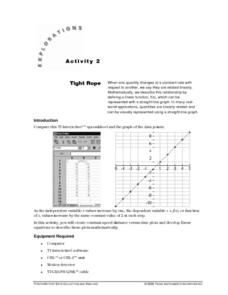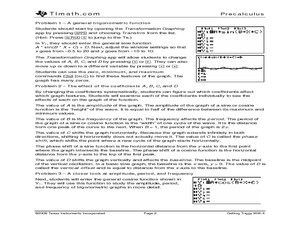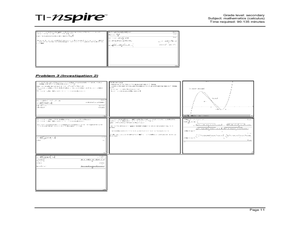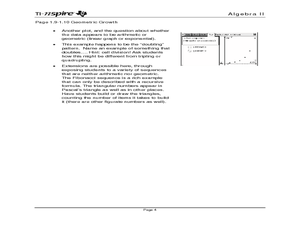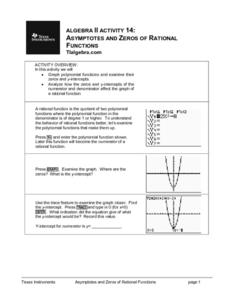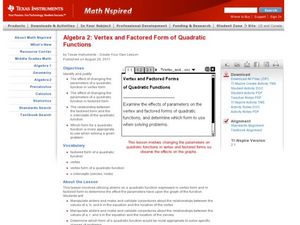Curated OER
The Quest for Roots of Higher Order Equations
Young mathematicians explore the concept of solutions to higher order equations as they find roots of polynomials of degree three or higher. They also use the zero function on the Ti-83 to locate zeros of polynomials on a graph.
Curated OER
Chill Out: How Hot Objects Cool
Teach how to explore exponential equations. In this Algebra II lesson, learners investigate the graph that occurs as a hot liquid cools. Students model the data algebraically.
Curated OER
Evaluation Expressions
High schoolers explore algebraic expressions in this Algebra I lesson. They evaluate expressions using paper and pencil and then use the TI-83 to provide immediate reinforcements.
Curated OER
Volumes of Rectangular Prisms
High schoolers determine the volume of a rectangular prism. They then maximize and minimize the volume given variable side lengths. Finally, they factor the volume equation to determine the side lengths.
Curated OER
Tight Rope
Learn how to explore the concept of linear functions. In this linear functions lesson, students collect linear data from a motion detector. Students walk to create a linear function. Students plot the points on a graph and determine a...
Curated OER
Discriminating Against the Zero
Students explore the concept of quadratic equations. In this quadratic equations lesson, students find the roots or zeros of quadratic equations using the quadratic formula. Students give examples of functions with 2 real, rational...
Texas Instruments
Making Predictions Using Systems of Equations
Students explore the concept of systems of equations. In this system of equations lesson, students enter data into lists on their calculators about 100 meter dash times. Students plot the points using a scatter plot and perform a linear...
Curated OER
Properties of Parabolas
Have your learners investigate parabolas. In this Algebra II lesson, students explore the basic definition of a parabola by using Cabri Jr. to create a parabola given the focus and directrix. Students interpret the equation for a...
Curated OER
Exploring Quadratic Equations
By stretching and translating the parabola given and determining the effects on the equation, students explore finding the vertex and zeros of a parabola and relate them to the equation. Students also view the intercept form to determine...
Curated OER
Exponential Decay
Students study exponential decay and its application to radiocarbon dating. In this exponential decay lesson, students use candy to model the time it takes for something to decay. Students also graph the data they collect and describe...
Curated OER
Getting Triggy With It
The concept of sine and cosine is explored in this activity where high schoolers graph sine and cosine graphs using a transformation application on the graphing calculator. Students change the coefficients for the amplitude, period,...
Curated OER
Exploring Complex Roots
In exploring the concept of complex roots, students find the axis of symmetry and roots of parabolas. Then, they discuss what makes a solution complex and how to identify functions with complex roots.
Curated OER
Investigating Equations of Lines
High schoolers investigate linear equations as they use technology (Cabri, Jr.) to explore the equations of lines in slope-intercept form. The technology allows learners to manipulate the line and observe the changes in the parameters of...
Curated OER
Two Investigations of Cubic Functions
Through learning about cubic functions, students graph cubic functions on their calculator. Students determine the local maximum and minimum points and the tangent line from the x-intercept to a point on the cubic function. Students...
Curated OER
Zeros of Polynomials
Young scholars graph polynomials. In this Algebra II lesson, students investigate the graph of a polynomial to determine the value and the number of zeros. This lesson requires the use of a graphing calculator.
Curated OER
Sequence Graphs
Investigate arithmetic and geometric sequences by using a graphing calculator to determine if a sequence is linear or exponential.
Alabama Learning Exchange
I'm Lovin' It: Finding Area Between Curves
Learners explore the concept of finding the area between two curves. In this finding the area between two curves instructional activity, students model the logos of McDonalds, Nike, and Motorola on grid paper. Learners find functions to...
Curated OER
Asymptotes And Zeros of Rational Functions
Budding mathematicians graph polynomial functions and examine their zero and y-intercepts. They analyze how the zero and y-intercepts of the numerator and denominator affect the graph of a rational function. Several great additional...
Curated OER
Maximum, Minimum, Increasing, Decreasing
Learners practice with the StudyCard set on assessing real-world contexts dealing with the concepts of maximum, minimum, increasing and decreasing. They view a variety of quadratic functions and equations with their TI-83 Plus calculators.
Texas Instruments
Math TODAY for TI-Navigator System - Is Leisure Time Really Shrinking?
High schoolers organize data from the USA TODAY Snapshot, "Is leisure time really shrinking?" into two scatter plots and determine the quadratic model for each scatter plot. They determine if these graphs intersect and learn the concept...
Curated OER
Graphing Rational Functions
Learners complete an activity, included, of the information on asymptotes and intercepts. They also solve and complete eight questions on graphing rational functions, file included. Finally, pupils summarize vertical asymptotes,...
Curated OER
Vertex and Factored Form of Quadratic Functions
Learners graph quadratic equations. In this algebra lesson, students solve quadratic equations by factoring. They identify the end behavior of the graph.
Curated OER
Comparing Exponential and Power Functions
Students compare and contrast exponential and power functions. In this precalculus lesson, students identify the value of x, using the graph as a visual. They compare functions with base of greater than one, to base of less than one.
Curated OER
Trains in Motion
Students compare two object as they find the distance between them. In this geometry lesson, students create an equation describing the distance of time as a function. They use the navigator to observe the distance.






